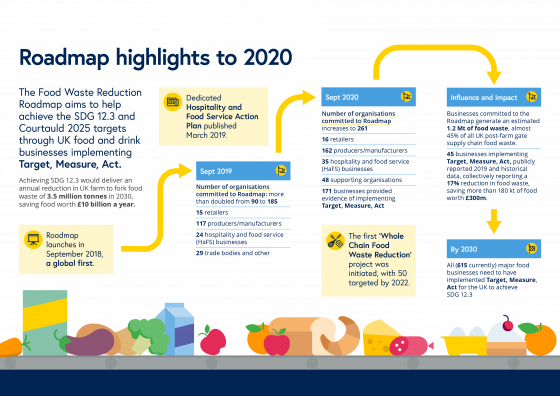Outlining progress made in the second year of the Food Waste Reduction Roadmap.
- More than 70 new food organisations have joined the Roadmap in the last twelve months, committing to ‘Target, Measure, Act’ on food waste in their operations, supply chain and customer base.
- Businesses implementing 'Target, Measure, Act' have increased from 121 to 171.
- 180,000t of food (worth £300m) across 45 companies reporting comparable data has been saved from becoming waste by Roadmap members.
- New Whole Chain toolkit equips businesses to tackle supply chain food waste farm to fork.
Embedding Target, Measure, Act into business culture and operations is critical to achieving UK and global targets, including the Courtauld Commitment 2025 and UN Sustainable Development Goal 12.3. It is also increasingly essential for enabling food businesses to manage their resources as efficiently as possible. This not only helps businesses to increase their resilience but also ensures that food surplus that does arise can be made use of, ideally through redistribution to people, rather than ending up as waste.
One of the ambitious aims for the Roadmap is to have all of the UK’s large food businesses implementing Target, Measure, Act by 2026. The Food Waste Reduction Roadmap Progress Report 2020 outlines the progress that has been made to date.

Key achievements
- 57 new food businesses have made the commitment since September 2019, joined by an additional 19 other supporting organisations, including companies such as Veolia, Suez and Biffa from the waste management sector.
- By mid-September 2020, 171 businesses had provided evidence to WRAP of implementing Target, Measure, Act (around 80% of those committed to the Roadmap). The combined turnover of these businesses is over £200bn, representing 50% of the overall turnover for UK food manufacture, retail and hospitality and food service.
- Businesses implementing Target, Measure, Act are already seeing the benefits. For example, 45 businesses publicly reported 2019 and historical data, and collectively reported a 17% reduction in food waste, saving over £300m of food (180,000 tonnes). Read our case studies to find out how they achieved this.
The Courtauld Commitment 2025
The Courtauld Commitment 2025 is the UK’s flagship voluntary agreement with the food and drink sector. Courtauld 2025 signatories have championed the work of the Food Waste Reduction Roadmap with the wider food & drink sector, and their collaborative work is instrumental in making sure the UK plays its part in achieving the Roadmap’s aims as well as UN SDG 12.3.
Whole chain food waste reduction
Get involved
Download files
By downloading resources you are agreeing to use them according to our terms and conditions.
These files may not be suitable for users of assistive technology.
-
 Download
DownloadFood-Waste-Reduction-Roadmap-Progress-Report-2020.pdf
PDF, 2.71 MB


